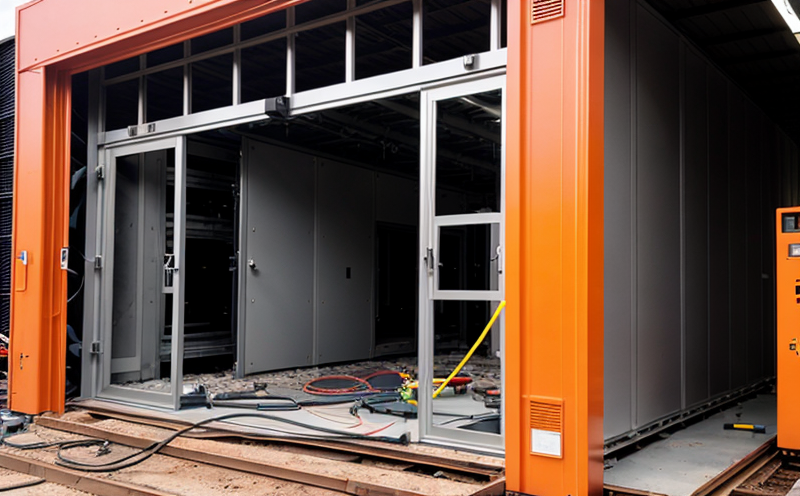IEEE 1881 Thermal Safety Testing of Stationary Battery Systems for Grid Applications
The IEEE Standard IEEE 1881 - Thermal Safety Testing of Stationary Battery Systems for Grid Applications is a critical guideline ensuring the thermal safety and reliability of stationary battery systems used in grid applications. These batteries are integral to modern energy storage solutions, playing a pivotal role in enhancing the efficiency and sustainability of power grids.
The standard aims to address the risk of overheating or thermal runaway incidents that could compromise the performance and lifespan of these batteries. By implementing rigorous thermal safety testing protocols as outlined by IEEE 1881, manufacturers and operators can ensure their systems meet stringent safety standards and comply with regulatory requirements.
Thermal management in battery systems is not merely about preventing overheating; it's also about optimizing operational efficiency and ensuring long-term reliability. The standard covers a range of tests that simulate real-world conditions to assess the thermal stability of batteries under various stress scenarios. This includes short-circuit currents, overcharging, and ambient temperature variations.
For quality managers and compliance officers, IEEE 1881 provides a robust framework for ensuring products meet regulatory standards before deployment. R&D engineers benefit from this standard by gaining insights into the thermal behavior of their designs under controlled test conditions. Procurement teams can use it to specify battery systems that adhere to these stringent safety criteria.
The testing process involves subjecting batteries and battery modules to a series of stress tests designed to mimic potential real-world operating conditions. These include high-temperature storage, cycling at elevated temperatures, and rapid discharge tests. The objective is to identify any vulnerabilities or risks associated with thermal performance early in the development cycle.
Testing for compliance with IEEE 1881 helps manufacturers demonstrate their commitment to safety and quality assurance. This can enhance customer confidence and reduce liability risks by ensuring products meet global standards. Furthermore, adherence to this standard can be a competitive advantage, as it signals a proactive approach to product safety and reliability.
By implementing these thermal safety tests, stakeholders in the energy storage sector can ensure their systems are robust, reliable, and safe for long-term use in grid applications. The ultimate goal is to contribute to a more sustainable and secure power supply infrastructure.
Applied Standards
The IEEE 1881 standard is part of the broader framework of international standards that guide testing and certification procedures for battery systems used in various applications, including grid storage. It draws heavily from other relevant standards such as ISO/IEC 60369-4 for electrical insulation materials, IEC 62619 for lithium-ion batteries, and UL 9540A for safety testing of rechargeable energy storage systems.
IEEE 1881 specifically addresses the thermal aspects of stationary battery systems. It provides detailed guidance on how to conduct tests that evaluate the thermal stability of these systems under various conditions. The standard is designed to ensure that batteries can withstand potential overheating scenarios without compromising safety or performance.
The testing protocols outlined in IEEE 1881 are comprehensive and cover a wide range of test cases, including:
- Short-circuit current tests
- Overcharging and over-discharging tests
- Ambient temperature cycling tests
- Rapid discharge tests
- Thermal runaway simulation tests
These tests are conducted in controlled laboratory environments to simulate real-world conditions. The results of these tests provide valuable data that can be used to refine and improve battery designs, ensuring they meet the stringent safety requirements specified by IEEE 1881.
Eurolab Advantages
At Eurolab, we specialize in providing comprehensive testing services aligned with IEEE 1881 and other relevant standards. Our experienced team of engineers and technicians ensures that each test is conducted to the highest level of accuracy and precision.
We offer a range of services tailored specifically for stationary battery systems used in grid applications. From initial design reviews to final certification, our expertise guarantees that your products meet all necessary safety and performance criteria.
Our state-of-the-art facilities are equipped with the latest technology, enabling us to conduct rigorous testing under controlled conditions. This ensures that the results we provide are reliable and actionable for improving product designs.
At Eurolab, our commitment is not just to perform tests but to offer valuable insights and recommendations based on test outcomes. We work closely with clients to understand their specific needs and challenges, providing personalized solutions to enhance product performance and safety.
We pride ourselves on delivering timely and accurate reports that are easily understandable by all stakeholders involved in the development process. Our goal is to help our clients achieve regulatory compliance while ensuring high-quality products that can be trusted for long-term use.





